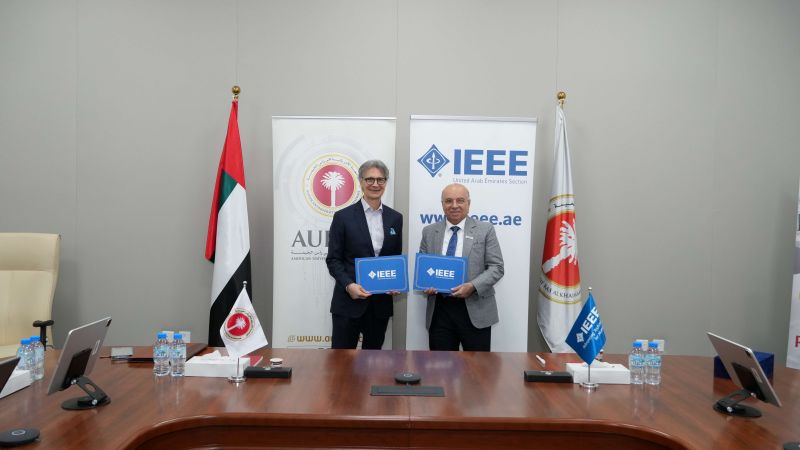The UAE Section of the Institute of Electrical and Electronics Engineers (IEEE) has signed a Memorandum of Understanding (MoU) with the American University of Ras Al Khaimah (AURAK) to advance collaboration in engineering and technology education.
The agreement aims to strengthen ties between academia and industry by promoting professional standards, innovation, and global engagement in the electrical and electronics engineering (EEE) field. It also opens the door for co-hosted conferences, guest lectures, academic exchange programs, and student competitions.
Speaking at the signing ceremony, Dr. David Schmidt, President of AURAK, described the partnership as a milestone for the university. “The importance of electrical and electronics engineering has grown significantly, and this collaboration will allow AURAK to tap into global expertise and advance academic excellence,” he said.
With more than 486,000 members in over 190 countries, including 189,000 student members, the IEEE is the world’s largest technical professional organization. Its activities span research publications, global conferences, and standards development, positioning it as a leader in fostering innovation in STEM fields.
The MoU will give AURAK faculty and students access to IEEE’s extensive resources, including the latest research, emerging technologies, and global networking platforms.
Prof. Hussain Al Ahmad, Chair of the IEEE UAE Section, emphasized the value of academic partnerships in shaping future-ready talent. “Together with AURAK, we aim to raise the bar in engineering education and cultivate a new generation of forward-thinking electrical and electronics engineers,” he said.
Dr. Ali Al Ataby, Chair of AURAK’s Department of Electrical & Electronics Engineering, expressed pride in the agreement. “This MoU unlocks new academic and professional opportunities. Students will gain valuable hands-on experience through IEEE-sponsored conferences and workshops, giving them a competitive edge in the job market.”
The collaboration is also expected to strengthen AURAK’s position in regional and global engineering education, with joint events and initiatives that will bring students closer to real-world applications and global trends.
Electrical and electronics engineers are instrumental in powering modern infrastructure, from renewable energy and smart grids to electric vehicle systems and industrial automation. With global demand for professionals in the field rising, the U.S. Bureau of Labor Statistics projects 9% job growth between 2023 and 2033, outpacing many other professions.
The AURAK–IEEE collaboration is expected to help meet that demand by preparing students with the technical skills, global exposure, and industry insight necessary to lead in the digital and sustainable future.

